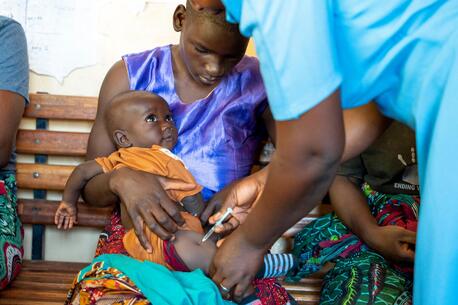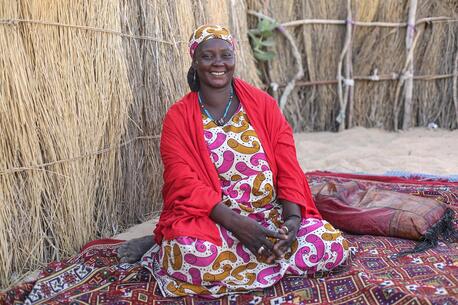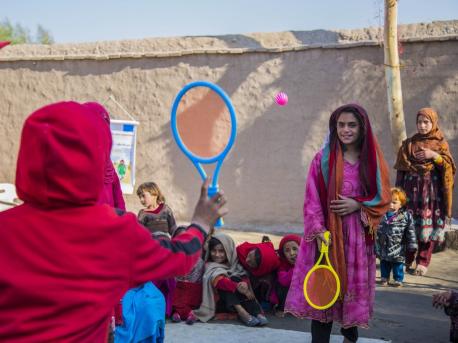
The Right to Play
There are more than a thousand families in Ettifaq village in Afghanistan's Nangarhar Province, near the border with Pakistan. Many are returnees from Pakistan or internally displaced persons impacted by violence and conflict in neighboring provinces.
A recent influx of new families fleeing armed conflict in the nearby Khogyani District has not been easy for Ettifaq, which has been inundated with refugee families over the past two years. Though physically removed from the conflict, Ettifaq has difficulties of its own. Schools and health facilities are far away and poorly equipped; access to clean water is limited. Children struggle to find a safe place to play.
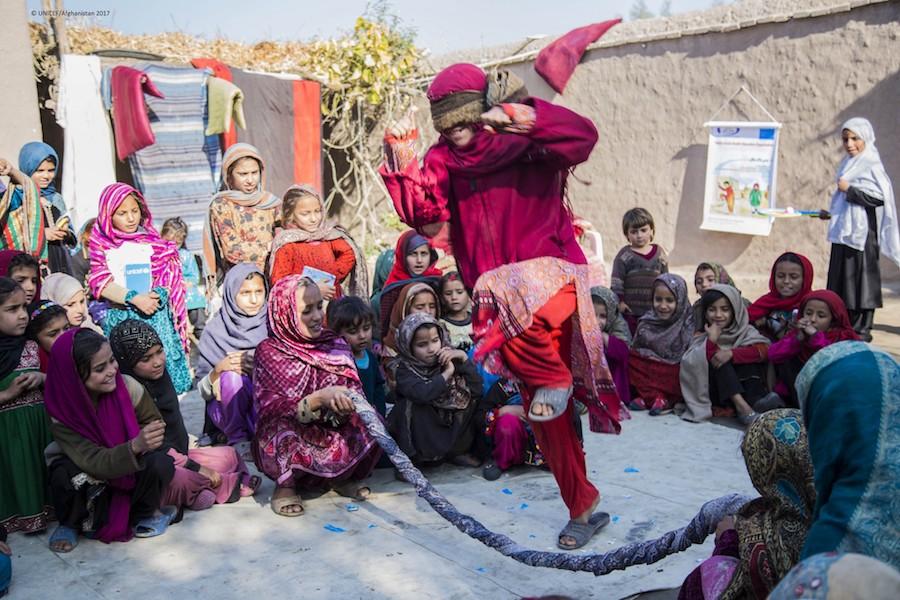
Working with Afghan NGO Tabish, UNICEF Afghanistan is creating Child-Friendly Spaces, supportive environments for children like those in Ettifaq, whose daily lives have been disrupted by conflict, displacement or migration. Trained to follow UNICEF guidelines on psychological, emotional and physical health during emergencies, Tabish staff provide support to Afghan children and women in crisis.
UNICEF-supported Child-Friendly Spaces offer a secure setting where children can be children, where they can run, sing and play together. These sanctuaries also offer essential health services like vaccinations and malnutrition screenings, and help protect children from exploitation and trafficking.
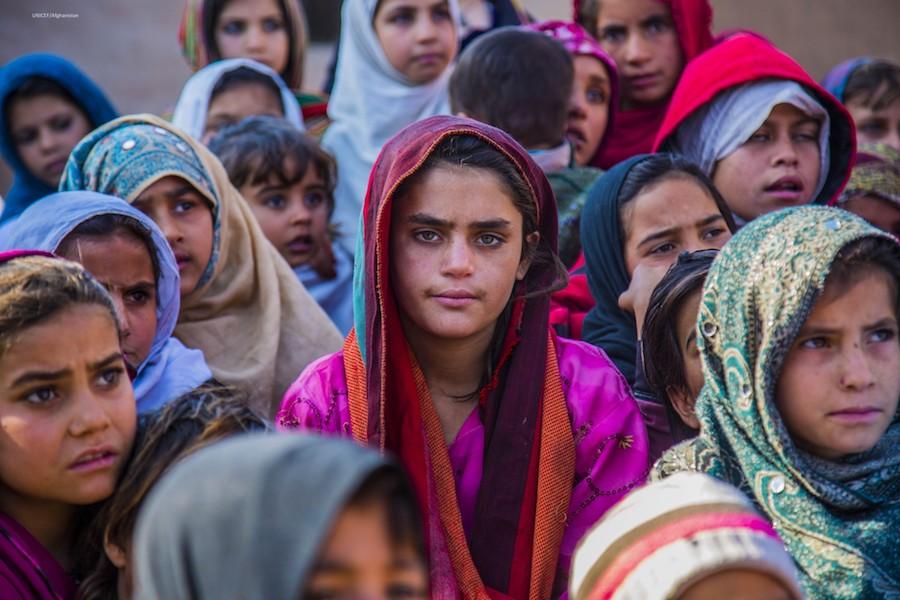
Saima (above, center) is a 12-year-old returnee from Pakistan. Her mother was widowed a few years ago, leaving her eldest brother, Basit, 17, to lead the family of nine. Basit works at a brick-making factory after school to support his family.
In addition to her family’s struggles, Saima lives with a cognitive impairment that makes her day-to-day life even harder.“It was not safe to let her go places by herself,” says her mother, Raj Bibi. “She used to sit at home, getting bored, crying for me to allow her to go outside."
Since Saima started attending the Child-Friendly Space, her mother has noticed positive changes in her daughter’s behavior. “Now that we have a safe place in the village for our daughters to play and learn, Saima is less aggressive than she used to be and she tries to listen to my words. She is much happier.”
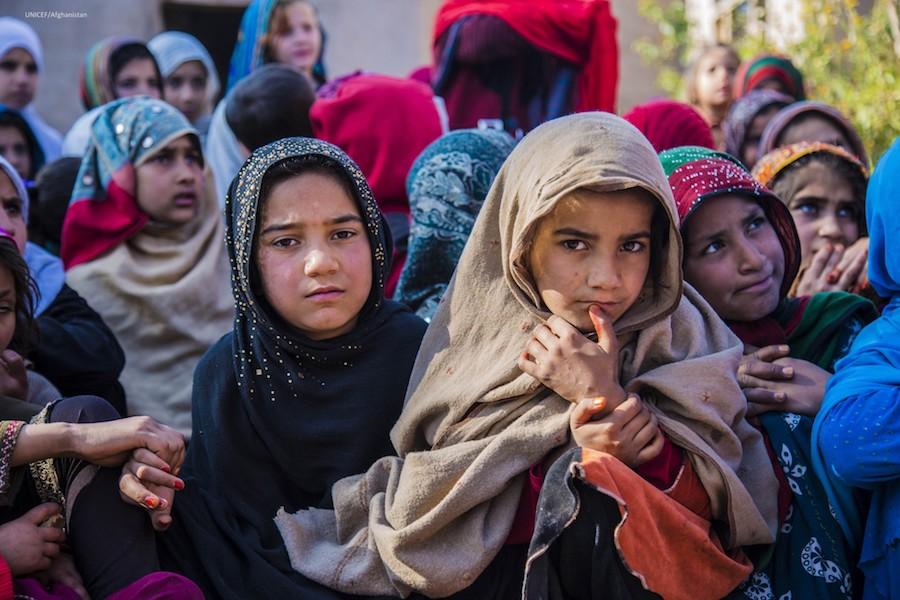
Zainab, 10, (above, right) and her six siblings left Wazir village in Khogyani District a few months ago when it was engulfed by fighting. Their home and belongings have since been bombed. The Child-Friendly Space in their neighborhood has provided Zainab and her sister, Madina, 8, with their first chance to go to school. "I always wished to study and play with other girls but never had an opportunity to go to a place where I could do that," says Zainab, who dreams of becoming a teacher.
"Our house is very far from a girls' school, and my husband does not allow the girls to travel so far because of the general insecurity here," Zainab's mother, Najiba, explains. "No girls from our neighborhood go to school." Girls older than 8 or 9 years old are not allowed to play outdoors in Ettifaq village, so Zainab is much happier since she discovered the Child-Friendly Space. She has also learned about good hygiene and is taking better care of herself and her younger sisters.
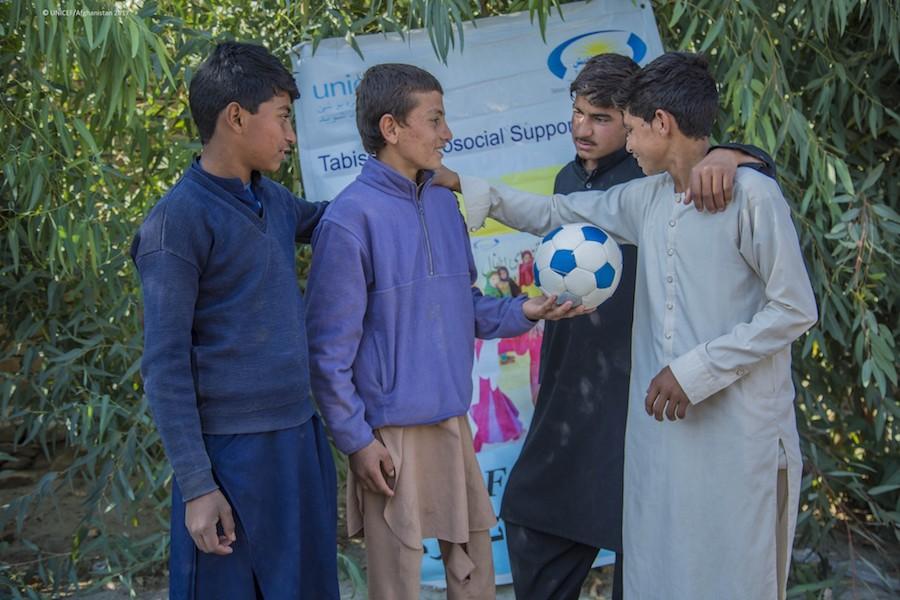
Thirteen-year-old Meraaj (above, holding soccer ball) is in the 8th grade. Six months ago, his family left their home in Kunar Province after his father was killed. An uncle helped Meraaj’s family resettle in Ettifaq and shares his home with them. The whole family — three sisters, two brothers and their mother — share a single room.
Meraaj rises early every morning to help his uncle, a house painter, until 9 A.M. In return, his uncle pays a small amount to help the family meet their basic needs. A month ago, Meeraj started going to the Child-Fiendly Space after finishing work.
“I used to feel sad and lonely because I lost my best friends and schoolmates when we had to leave our home. I wished for someone to talk to," says Meeraj. "Since I started coming here, I made three best friends. We play soccer and enjoy our time together. Whenever I feel unhappy, I share my problems with them and then I feel lighter. "
“Before this place, we couldn't even afford a soccer ball. We didn't have access to a person like our teacher, who guides us to be good friends to each other," says Rahimullah, 14, one of Meeraj's new friends. "When Meraaj joined the class, he wouldn’t talk to us. He was very sensitive and cried over small things. He eventually talked about his father’s death and how upset he is about his family’s poor economic situation."
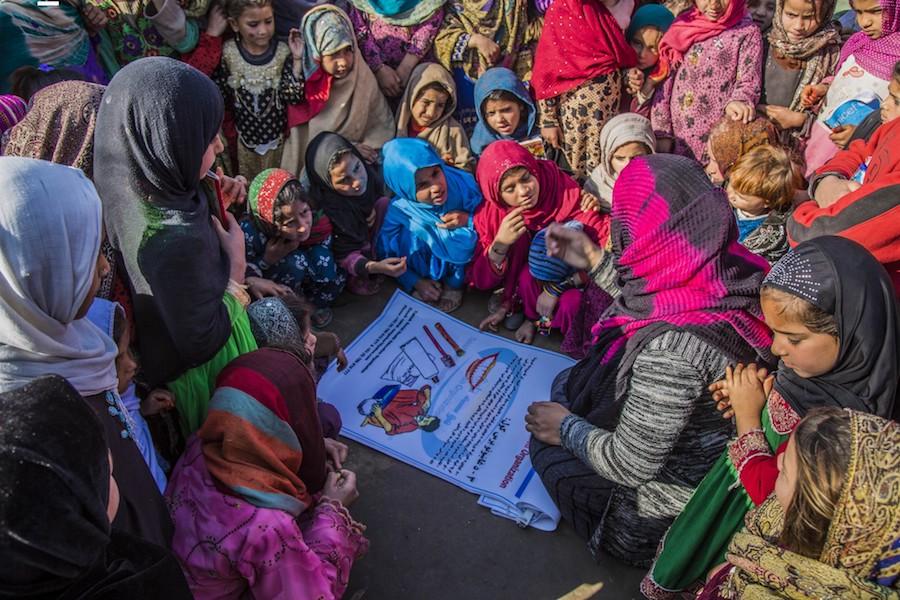
The UNICEF-supported Child-Friendly Space in Ettifaq organizes fun and educational activities, like learning sessions about good hygiene practices (above). "The center is a big opportunity for our daughters to get together and interact with other children," says Zainab's mother, Najiba. "We feel our daughters are safe there and hope one day they will find a chance to go to a formal school as well."
Counseling for children in crisis is being provided through Child-Friendly Spaces in Afghanistan with generous support from the British government.
All photos © UNICEF Afghanistan/2017/Sharukhi
There are more than a thousand families in Ettifaq village in Afghanistan's Nangarhar Province, near the border with Pakistan. Many are returnees from Pakistan or internally displaced persons impacted by violence and conflict in neighboring provinces.
A recent influx of new families fleeing armed conflict in the nearby Khogyani District has not been easy for Ettifaq, which has been inundated with refugee families over the past two years. Though physically removed from the conflict, Ettifaq has difficulties of its own. Schools and health facilities are far away and poorly equipped; access to clean water is limited. Children struggle to find a safe place to play.

Working with Afghan NGO Tabish, UNICEF Afghanistan is creating Child-Friendly Spaces, supportive environments for children like those in Ettifaq, whose daily lives have been disrupted by conflict, displacement or migration. Trained to follow UNICEF guidelines on psychological, emotional and physical health during emergencies, Tabish staff provide support to Afghan children and women in crisis.
UNICEF-supported Child-Friendly Spaces offer a secure setting where children can be children, where they can run, sing and play together. These sanctuaries also offer essential health services like vaccinations and malnutrition screenings, and help protect children from exploitation and trafficking.

Saima (above, center) is a 12-year-old returnee from Pakistan. Her mother was widowed a few years ago, leaving her eldest brother, Basit, 17, to lead the family of nine. Basit works at a brick-making factory after school to support his family.
In addition to her family’s struggles, Saima lives with a cognitive impairment that makes her day-to-day life even harder.“It was not safe to let her go places by herself,” says her mother, Raj Bibi. “She used to sit at home, getting bored, crying for me to allow her to go outside."
Since Saima started attending the Child-Friendly Space, her mother has noticed positive changes in her daughter’s behavior. “Now that we have a safe place in the village for our daughters to play and learn, Saima is less aggressive than she used to be and she tries to listen to my words. She is much happier.”

Zainab, 10, (above, right) and her six siblings left Wazir village in Khogyani District a few months ago when it was engulfed by fighting. Their home and belongings have since been bombed. The Child-Friendly Space in their neighborhood has provided Zainab and her sister, Madina, 8, with their first chance to go to school. "I always wished to study and play with other girls but never had an opportunity to go to a place where I could do that," says Zainab, who dreams of becoming a teacher.
"Our house is very far from a girls' school, and my husband does not allow the girls to travel so far because of the general insecurity here," Zainab's mother, Najiba, explains. "No girls from our neighborhood go to school." Girls older than 8 or 9 years old are not allowed to play outdoors in Ettifaq village, so Zainab is much happier since she discovered the Child-Friendly Space. She has also learned about good hygiene and is taking better care of herself and her younger sisters.

Thirteen-year-old Meraaj (above, holding soccer ball) is in the 8th grade. Six months ago, his family left their home in Kunar Province after his father was killed. An uncle helped Meraaj’s family resettle in Ettifaq and shares his home with them. The whole family — three sisters, two brothers and their mother — share a single room.
Meraaj rises early every morning to help his uncle, a house painter, until 9 A.M. In return, his uncle pays a small amount to help the family meet their basic needs. A month ago, Meeraj started going to the Child-Fiendly Space after finishing work.
“I used to feel sad and lonely because I lost my best friends and schoolmates when we had to leave our home. I wished for someone to talk to," says Meeraj. "Since I started coming here, I made three best friends. We play soccer and enjoy our time together. Whenever I feel unhappy, I share my problems with them and then I feel lighter. "
“Before this place, we couldn't even afford a soccer ball. We didn't have access to a person like our teacher, who guides us to be good friends to each other," says Rahimullah, 14, one of Meeraj's new friends. "When Meraaj joined the class, he wouldn’t talk to us. He was very sensitive and cried over small things. He eventually talked about his father’s death and how upset he is about his family’s poor economic situation."

The UNICEF-supported Child-Friendly Space in Ettifaq organizes fun and educational activities, like learning sessions about good hygiene practices (above). "The center is a big opportunity for our daughters to get together and interact with other children," says Zainab's mother, Najiba. "We feel our daughters are safe there and hope one day they will find a chance to go to a formal school as well."
Counseling for children in crisis is being provided through Child-Friendly Spaces in Afghanistan with generous support from the British government.
All photos © UNICEF Afghanistan/2017/Sharukhi

